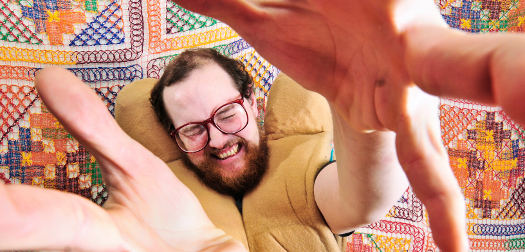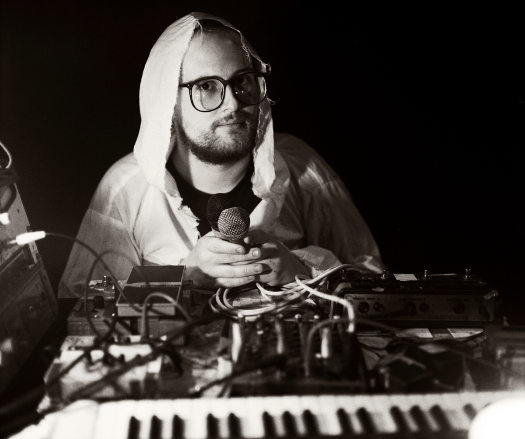Features
Dan Deacon: The New Face of Beauty
by Adam King | photography by Josh Sisk
February 1, 2009
Dan Deacon: The New Face of Beauty
by Adam King | photography by Josh Sisk
February 1, 2009
page 3 of 3
|
|
|
|
 |
||
|
|
|
[laughs] All right‚ cool.
I also hate the word "hipster." I feel like it's always said in a negative context. I feel like most of my audience‚ at least when I first started‚ was just nerds. I'd play basement shows and shit like that‚ and the people were definitely there to hear new music. I think a hipster is someone who goes to a show for the sole purpose of being at something that they think is cool‚ not something that they're there to necessarily enjoy. I think that's the main thing that divides the music audiences -- the people who are there for a specific reason of seeing and hearing live music‚ and then the whole other half of people that are there for being seen.
And I think that the line gets especially blurred in the dance music world‚ because a lot of people go to see DJs to meet people‚ to socialize. So when you play dance music‚ those two worlds collide‚ and that's where a lot of the tension comes from. And I don't know‚ people do different things for different reasons. Anyway‚ when it gets put under a magnifying glass on the Internet‚ that's when you could nitpick any audience of any band and sit there all day. It just depends on how much money you have in your PR to make sure that doesn't happen.
Part of your shows has always been to blur the line and to have a collaboration between audience and performer. Do you feel now that you're taking on more of a leadership role with an ensemble that it's going to put you in control of people more?
Oh‚ man‚ these terms are getting creepier and creepier. I don't like to think of it as control or anything like that. When I would perform solo it was always about let's see how far the audience is willing to get taken. Like how far can I take the show without it leaving the realm of being a show? How long can I talk for? How long can I tell the absurd story? How long can I play these sorts of games? What can I do to get the audience to interact in a way that they're not used to interacting? How can I utilize the performance space in a different way? And I'd still like to do that‚ but I want to now refocus it in as a show or a performance. Where before it was just like chaotic mayhem. The goal was to see how much you can organize chaos. And now I want it to be still just as chaotic and on the edge of falling apart‚ but also at the same time a very large-scale production is happening.
Is the plan to stick with the full band for a while?
There's no plan. The American tour will have an ensemble. That's for sure. I want to see how it goes‚ I've never done anything like this before. I don't know if the album is gonna be successful‚ don't know if people are gonna like it‚ don't know how my life is gonna change. Everything can change very quickly‚ so I don't want to get caught up in anything. I don't want to define my musical ideology while I'm still forming it‚ you know what I mean?* * *

Wham City: An artists' collective in Baltimore that Deacon has long been an integral part of. Both a stepping stone and a home base for his off-tilt musical endeavors.
Absurdism: The notion that humans exist in a meaningless universe‚ and that any attempt to find meaning in the universe is thus absurd. So in music‚ the idea is that beauty can be found in the obscure and irrational nature of a musical piece itself. The term better describes older Dan Deacon material and he admits "I used to feel a lot more in line with this philosophy but no longer."Futureshock: An attempt to categorize Deacon into a musical genre‚ essentially defined as an embrace of modern technology and a straying from the traditional realms of popular music. In Deacon's words‚ "I mainly think futureshock is a good label for any band that exists outside of the template that is 'successful band/musician' format."
Signal Generator: An electronic device that generates square waves and sine waves which can then be repeated and cycled against one another. It's what makes those pneumatic pulsars you hear in Dan's set. He uses a Wavetek 180 that he found in the dumpster of Purchase College.
Pitch Shift Harmonizer: A pedal that Dan runs his vocals through‚ allowing him to both change the pitch of his voice and add a harmony note to it. When he starts singing like Tiny Tim on helium‚ this is what's making it happen.
Timbre: Pronounced "tamber" -- the tone quality or color of a sound or note. It's what you hear in the difference between a trumpet and a saxophone playing the same note‚ and in electronic music‚ the timbre can be manipulated to produce unforeseen and unique sounds.
Visit Dan Deacon
related articles
Features: Best Songs of 2012
Blog: Best Songs of 2012: Dan Deacon - "U.S.A. I-IV"
Blog: Best Songs of 2012: Dan Deacon - "Call Me Maybe Acapella 147 Times Exponentially Layered"
Albums: Dan Deacon - America
Blog: Listen: Dan Deacon - "True Thrush"
More on: Dan Deacon
Features: Best Songs of 2012
Blog: Best Songs of 2012: Dan Deacon - "U.S.A. I-IV"
Blog: Best Songs of 2012: Dan Deacon - "Call Me Maybe Acapella 147 Times Exponentially Layered"
Albums: Dan Deacon - America
Blog: Listen: Dan Deacon - "True Thrush"
More on: Dan Deacon
new to state of mind
Shows: moe.
Shows: Yonder Mountain String Band
Shows: Grand Point North 2014
Shows: Catskill Chill 2014
Shows: moe.down 15
Shows: Gov't Mule
Shows: Umphrey's McGee
Shows: Newport Folk Festival 2014
Shows: Widespread Panic
Albums: Phish - Fuego
Shows: moe.
Shows: Yonder Mountain String Band
Shows: Grand Point North 2014
Shows: Catskill Chill 2014
Shows: moe.down 15
Shows: Gov't Mule
Shows: Umphrey's McGee
Shows: Newport Folk Festival 2014
Shows: Widespread Panic
Albums: Phish - Fuego
random awesomeness
Shows: Buckethead w/ Wolff
Shows: Wakarusa 2012
Blog: Listen: Akron/Family - "No-Room"
Blog: The 2nd Life of 8-Bit Sonics
Blog: Funky Monday: Brother Jack McDuff - "The Vibrator"
Podcast: State of Mind Radio: Epidode 25
Shows: Galactic
Shows: The Felice Brothers
Blog: The Dead
Blog: Rubblebucket on Jimmy Kimmel Live
Shows: Buckethead w/ Wolff
Shows: Wakarusa 2012
Blog: Listen: Akron/Family - "No-Room"
Blog: The 2nd Life of 8-Bit Sonics
Blog: Funky Monday: Brother Jack McDuff - "The Vibrator"
Podcast: State of Mind Radio: Epidode 25
Shows: Galactic
Shows: The Felice Brothers
Blog: The Dead
Blog: Rubblebucket on Jimmy Kimmel Live
